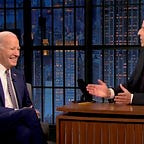President Biden on “Late Night with Seth Myers” last night, joking: “You gotta take a look at the other guy. He’s about as old as I am... but he can’t remember his wife’s name."
Last week, Dr. Charan Ranganath, a University of California, Davis, neuroscientist who focuses on the the study of memory, came on my SiriusXM program to discuss the issue that had blown up in the media: President Biden’s age. He’d written an op-ed for the New York Times that was a rare bit of solid media coverage in a sea of sensationalism.
There is a lot of misunderstanding—and a great many stereotypes—about aging and the brain. That is certainly clear if the polls are to believed (or even are close) regarding Americans’ concerns about President Biden (even if it’s not going to change the way they vote, according to most of those same polls). And our media hasn’t done much to enlighten people, choosing instead to feed their worst fears.
So I invited Dr. Ranganath on my program to give us some insights. You can listen to the full interview here. A transcript, slightly edited for clarity and space, is below. Let me know your thought!
The Signorile Report is reader-supported. If you’ve valued reading The Signorile Report, consider becoming a paid subscriber and supporting independent, ad-free opinion journalism. Thanks!
Michelangelo Signorile: I'm so looking forward to this conversation. Why are so many people thinking about President Biden's memory and age, and that includes the majority of Americans—if we're to believe polls—in the wrong way?
I'm really glad to have on the program Dr. Charan Ranganath, who is a professor of psychology and neuroscience and the director of the Dynamic Memory Lab at the University of California, Davis, and the author of a book soon to be published, "Why We Remember: Unlocking Memory's Power to Hold on to What Matters." Doctor Ranganath, thank you so much for joining us.
Dr. Charan Ranganath: Well, thank you for having me. I'm always excited to share the word of memory with people.
MS: Yeah, it's really been dispiriting seeing a lot of the way this has been discussed, because the media coverage has been just overwhelming, the discussion of President Biden's age and then how that connects to the issue of memory and the issue of decision making, which connects, obviously, to memory.
And what's been dispiriting is not necessarily the discussion of it, because obviously it's something that Americans are concerned about, at least a certain number of them. But there really hasn't been a sort of moment of education about what it really means. And you provided that in an op-ed that you wrote in The New York Times. Talk a little bit about the way that we're looking at this and why it's not quite getting it right. People are not separating out the different kinds of memory, or, as you say, forgetting with a small f and Forgetting with a capital F.
CR: Yeah, I think this is a very important issue. And, you know, I want to be clear that this isn't—this is something that cuts across party lines. I mean, Donald Trump is also fairly advanced in years. And, let's face it, 1 in 6 Americans are over the age of 65. So I think when I read Special Counsel Hur's report, or at least the quotes from it, and have gone through a little bit of it, it just seemed to be hitting at people's stereotypes about aging. And when I actually read the piece, a lot of the examples of what they were talking about with Biden's forgetting were not actually the kinds of things that I would worry about as someone who studies memory.
So, as you pointed out, I say that there's forgetting with a lowercase f and there's Forgetting with the capital F. So we all do both. Let me be clear but let's first talk about the first one, which is really what researchers would call retrieval failure. And this is when the memory is there, but we just can't find it. So these would be things like, you know, I had a conversation with you yesterday and oh, what were we talking about again? And then a day later it comes to you.
So that's one of the memories there, but you can't get it. That happens a lot as we get older. On the other hand, there's Forgetting with the capital F, which would be like, I had a conversation with you yesterday, and I have no memory of it whatsoever. And that would be Forgetting with the capital F.
Everyone who's been studied shows some kind of Forgetting [with a capital F], but it does happen a little bit more as we get older. But really, if it happens a lot and it happens for things that happened just a short while ago, then I would be worried about that. The examples that I've seen from Biden, however, they don't seem to be forgetting with the capital F.
So, for instance, there's nothing that indicates that he couldn't remember anything from his last year of his vice presidency or, around the time that his son died. And yet he just couldn't name the years in which these things happened, which is something that does happen a lot with age. People will remember what happened, but they start to lose some of the details about the context, or they just have trouble pulling it up when they need it.
Some of the other issues that I think were brought up weren't even memory issues at all. They're things like, you know, mixing up in the media. People made a thing about mixing up, instead of saying the president of Egypt, he said, the president of Mexico. And it's not like as if the president doesn’t know the difference between Egypt and Mexico, right?
It was what people would categorize as one of Biden's gaffes, which is not finding the right word when you need it. And again, this is something that happens to many people. As you get older, you make more of these verbal mistakes, and you can't necessarily correct it as quickly. But that doesn't mean that there's a memory problem there.
MS: I speak three hours a day every weekday, and this must happen to me every day or every couple of days. I mean, you pull up the wrong word, you pull up the wrong name. I think I just did it with neurologist versus neuroscientist. Right. So, I mean, it does happen to all of us. And there's also, I mean, I speak to people who I've known for many years and tell me about something that happened like 30 years ago. And like, I realize I've forgotten that whole thing. And yet I remember it when they tell me. That’s pretty normal, too, right?
CR: Oh, yeah, that's a perfect example of lowercase f forgetting. Because often the memory is there, and we just can't find it when we need it. I have all sorts of experiences like this, too, both with the kind of mixing things up. In fact, just yesterday I did an interview where I was literally talking about Biden, and I couldn't find the right word, and I said the wrong thing, and I had to correct myself and do the take over again, so I can relate.
MS: So that's where I think there has been an enormous amount of misunderstanding in the public and not enough educating. And it's such a moment to educate people about memory and about aging and how they are not understanding how it works, because if we're to believe some of the polling or the interviews, people seem to believe that because somebody, doesn't have of the word, you know, correct at a particular moment in talking about a country or, doesn't seem to be speaking at a certain speed or is speaking in a slower cadence or something, that it means that it somehow affects their ability to make major decisions, major, complex decisions about foreign policy, or other issues.
I even heard people in a focus group saying, it makes me worried that he'll forget where the nuclear codes are or something like that. So talk a little bit about that and how that is just a complete misunderstanding of how this works.
CR: Well, yeah, I mean, first of all, I don't know much about how the presidency works. I imagine that he doesn't really have to seriously memorize nuclear codes and keep them at a moment's notice. I'm sure there's more of a process to it than that. Right. But I don't know. I think that struggling with remembering the right thing is the kind of thing that we often rely on others, you know, and we can often rely on devices to do these things. And so, we often outsource what we're trying to remember. I don't know about you, but, you know, my phone has a photographic memory. And so I take advantage of that and just put any names, phone numbers, and all these things I need.
MS: Right —to that point: There was a time when we all had on the tips of our tongues, maybe ten phone numbers that we could recite, at least those of us who have been alive for a while. And now you couldn't. I couldn't say the phone number of even the people closest to me.
CR: Yeah, exactly. And we don't have to. That's the thing. And that doesn't mean we can't. And outsourcing these things doesn't necessarily mean that there's going to be some atrophy in our brains. It's just lightening the load. As long as we can focus on what we need to focus on, we're good.
MS: Why do people believe that because somebody flubs words, because somebody, forgets the name of a country, that it somehow means they could not lead the country and make complicated decisions.
CR: I think that there's two factors involved. You know, I can't get into the voters heads, per se, but I think there's two factors involved. One is that, I think that there's a stereotype out there, that aging is this progressive, progressive decline, and we just get worse and we're just marching towards dementia. And that's not really true. In fact, if you look at studies where you follow the same person over time, there's some people who do really well and maintain their thinking and memory and so forth, well into old age.
And then there's others who do show a decline, and sometimes it can be a sharp decline. And I've seen people who are relatively young, I mean, you know, maybe in their 60s, for instance, who are extraordinarily fluent and can speak, you know, eloquently, but they have clinically significant memory disorders that would lead them to not be functional. Actually, if you even listen to late interviews with Ronald Reagan and, uh, former Prime Minister Margaret Thatcher from the UK, what you'll find is, is that when they were probably—and again, I can't say for sure —but when they were probably in the early stages of Alzheimer's, they were still exceptionally articulate.
So often people's perceptions don't match up with the realities because we're seeing somebody who might look weak, they might be straining to speak in certain ways, or they struggle to find the right words. But that's not memory. That's something else.
MS: When you look at the schedule of someone like the president, any world leader or even any candidate and what they're doing every day and the amount of information they're processing, talk about that and how, again, looking at them tripping up a word doesn't comport with what they've probably been experiencing.
CR: I think that one of the things to keep in mind is that when people are under stress, the best way to put them under stress is to have them do a press conference. I mean, literally, this is what we would do in the lab when we study the effects of stress on memories. We tell them they're about to give a speech, and it dramatically raises people's cortisol levels.
So, I would say that those, especially that kind of communication, stress will make it harder often to pull up the right word because it tends to shut down areas like the prefrontal cortex, which help us get what we need and focus us on the right information.
And the problem is that as you get older, that function tends to decline a little bit, and then you're under stress. And for someone like Biden, he also had a stutter from a very young age. And I think that's relevant, too, because that makes it harder to find the right word. I know listeners will be thinking, Yeah, but the president has to function under stress. So and I totally agree with that. I think, though, that the stress and the situation of public speaking doesn't necessarily comport with many real situations where it's really about the knowledge of how to get things done.
And then there's other factors that come into play, like, you know, regulating your emotions as one, emotional intelligence and compassion as another, because a lot of the important decision making is influence, and memory is a very big part. But there's all these other parts, too, that go into making good decisions that are good for the people. And I think we just need to think about this in a more holistic fashion.
MS: What you're pointing to is something we've seen in some reports of those who know the president or have been interviewed, who work with the president and say that in private or, you know, in a room full of people making decisions, he’s completely lucid and he's clearly, very much aware of everything he's talking about. He's taking a leadership role.
And yet when you're under the pressure of public speaking or the campaign, it is a time when mistakes are made. And it really points to the difference between governing and campaigning and how superficial, in that sense, campaigning is because it is about performing. Right.
CR: I mean, I'm a scientist, so I can't tell people how to think about things. But what I would say is that often we miss people, mistake confidence for, you know, cognition. And so sometimes if people are extraordinarily confident and are communicating in a confident way, it's easier to give them a pass on the kinds of gaffes that we've been talking about. And I think if people don't communicate in such a confident way, and then we think, oh, wait, especially if they're older, you know, then there's kind of a tendency to say there's something wrong with them. And I think that's very misleading, and I think it can send people in the wrong path.
MS: Well, that's interesting too, because it might explain why some people seem to think that even though Trump makes all of these flubs all the time, that he's not old enough or that he's not too old but they think Biden is. But maybe Trump just says it with more confidence and just brushes past his flubs.
CR: I don't want to come off as kind of a partisan person here, but I do know of, like, you know, there's a famous incident where in a Trump speech where he mixed up Nikki Haley and Nancy Pelosi. Right? I'm sure he knows the difference again, between these two people. But then later, when he was questioned on it, I think he actually had said that, oh, I knew what I was doing.
MS: It was on purpose. Right. And he said the same thing about Obama. When he switched up, he mixed up Obama and Biden. He tried to create this idea that he means Obama is really running the country. I guess a certain number of people will believe him.
CR: Yeah. You know ,and again I don't necessarily know how people end up coming up with these impressions. What I would say is, if you come off as if you know you have mistakes like that and you can be confident though, and say, well, I really meant to say that, then maybe people like voters will look at that and go, oh yeah, he's this is a strong person. This is a person who really is with it. And they're just messing with us or something. You actually see this in older adults—-that some are just very good at being able to mask some of the difficulties they're having and some are very not good at doing that. And so we just don't know from external appearances.
MS: Well, I really appreciated this conversation and really glad to have you on the program to help people understand it. Thanks so much for coming on today.












